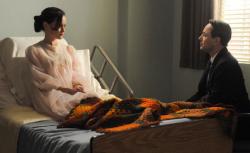John, I suspect you’re right about Don in the bar. Just because the opportunity to dally presents itself doesn’t mean he’ll take it. Let’s hope not, anyway.
Before we conclude for the season I wanted to single out a few of the lovely moments in the finale. Lane’s absence haunts the office in understated ways, and that dysfunctional partner’s meeting was a marvelously quiet demonstration of how Lane’s grave caution served as a plumb weight for the firm. Without him, the flip impatience of the other male partners has no counterbalance. I loved when Joan finally broke down and tried to play herself and Lane (a third role, given that she’s already playing Joan the partner and Joan the office manager).
Joan also seemed to have settled nicely into her partner’s role. So far, there don’t seem to be any icky consequences for the way she earned her 5 percent. (In fact, she seems to be wondering if her secret weapon, strategic sex, could have helped prevent Lane’s suicide, too.)
I’ve also been thinking more about the larger significance of Pete’s plot arc this season. Why focus so much on his dissatisfaction with success, on his connection with a not-fully-realized housewife? I suspect his realization in the finale—essentially, that he’s depressed, even if the culture of the time makes that harder for a man to admit—is a fairly substantial one, even if the mechanism that revealed it to us wasn’t wholly satisfying. After all, Pete’s been a weirdo since the pilot—why else would he go to outer Brooklyn to pursue a dowdy secretary the night before his wedding? Nothing satisfies him, ever. No wonder he’s such a twit.
Of course, perhaps that’s what the writers of the show would say about us upon hearing our gripes. This was a slow-paced finale to a truly excellent and gripping season—one of the best in Mad Men’s run. The fact that the episode didn’t bring the shock value of starting a new firm, or Don’s surprise proposal, doesn’t diminish the power of what we’ve seen. This was the year when our characters learned that they’re not necessarily in it together—with their colleagues, with their spouses, with their moms. In the end, each character is accountable only to him or herself. We’ll see where that takes the firm, and Don, in the season to come.
Thankfully, there will be one.
I’m getting scurvy,
Julia
Mad Men review: Recap of The Phantom and Pete’s role in the finale.
Pete’s been a weirdo since the beginning.

Michael Yarish/AMC
Advertisement